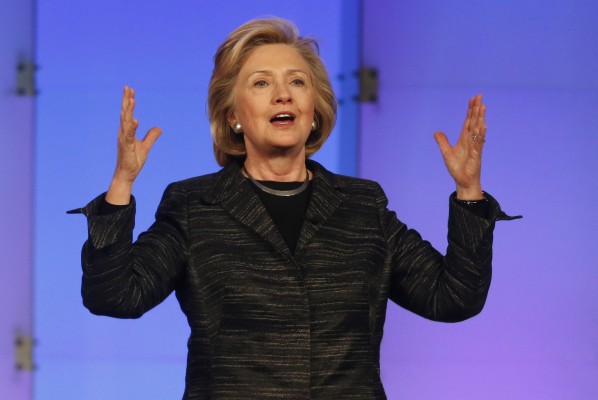We Should Scrutinize Presidential Campaign Funding
TNS
Hillary Clinton is preparing for a historically expensive campaign. (Karl Mondon/Bay Area News Group via TNS)
April 29, 2015
As the 2016 presidential elections are beginning to take form, information about the candidates’ proposed campaign fundraising is being released to major news sources. In the wake of Hillary Clinton’s recent campaign announcement, The New York Times reported that her “effort [is] likely to cost more than any presidential bid waged before,” with goals circling around $2.5 billion. Yet Clinton is not the only one preparing so fervently, with other news sources reporting on dinner invitations priced in the tens of thousands, and The New York Times detailing that the Koch brothers, as recently as January of this year, have planned on “spending close to $900 million on the 2016 campaign… an unparalleled effort by coordinated outside groups.”
Fortunately, information on campaign funding is increasingly publicized, so American voters should lend a critical eye to proposed campaign spending amounts. Additionally, voters need to analyze this financial data to form questions about the candidates’ and their donors’ motives, then use the information they obtain to develop proactive voting choices and strategies.
It’s very important to know where a candidate’s money is coming from, and why so much of it is needed. The Economist explains that “American elections are expensive because America is a big, rich country: reaching a population of [314 million people] costs a lot, particularly in competitive media markets such as New York and Florida.” High amounts of fundraising are somewhat substantiated by the necessity to garner name recognition, a party nomination, and support from swing states. Much of the money that presidential candidates receive for their campaigns comes from organizations such as super-PACs, non-profit 501(c)(4)s and, most interestingly, billionaire individuals or families. The process by which the money filters from large and well-financed donors to a candidate’s campaign is widely known as one of the most complicated, and in some ways hidden, aspects of the American democratic system. What’s really significant here is that private enterprises that become presidential campaign donors effectively gain a certain amount of influence over the candidates they support, thus garnering for themselves a bit of power.
This is why the proposed funding for the 2016 presidential campaigns should be viewed critically by the American public. An increase in organized power leads to a decrease in the power of the individual American citizen. Additionally, those who are rich already have major amounts of influence both economically and socially, so adding the loyalty of a presidential candidate and the political power that comes with it is problematic. The American public should be wary of individuals such as the Koch brothers, who have already secured the attention of journalists because of their vast and intimidating political network. This is not to say that average Americans should view every successful businessman (or team of businessmen) as Public Enemy No. 1; but, when given the chance, voters should ask candidates how they developed relationships with their campaign donors, and the donors should be asked why they chose to donate to the candidate.
The immediate response some voters may have when examining potential presidential candidates is to become unsupportive of those with extravagant fundraising strategies. This is a knee-jerk reaction that should be avoided. The most powerful action that American voters have at their disposal is their ability to make informed decisions about their democratic choices. It is especially important for voters to be aware of the sources and context of donations. Voters need to be more motivated to use this data to their advantage when voting for presidential candidates. That way, one can still vote for whoever appears to be the most qualified, but that vote must in some way take influential campaign donors into consideration.













